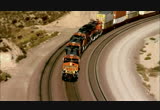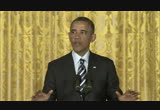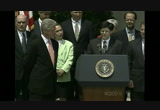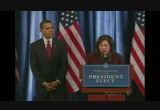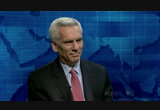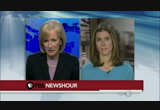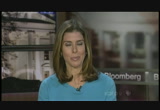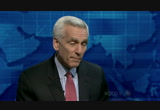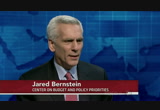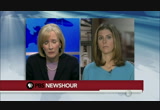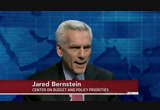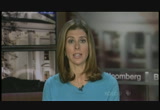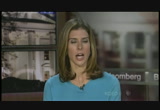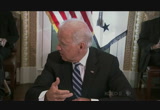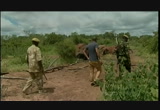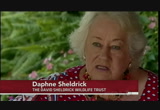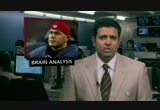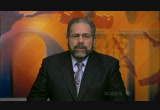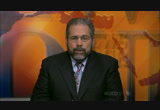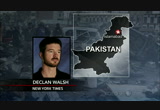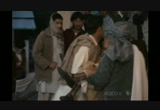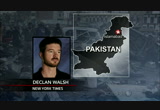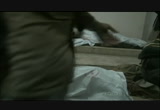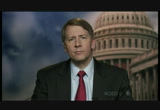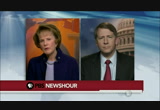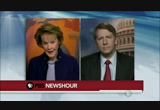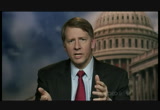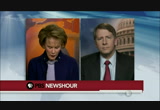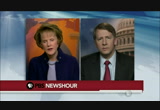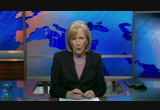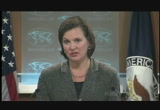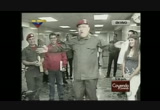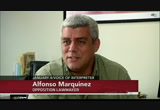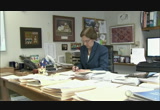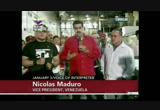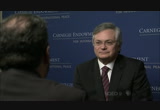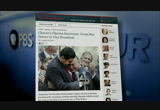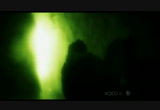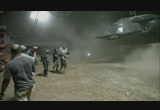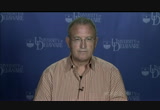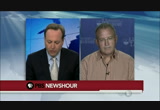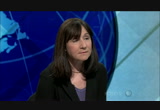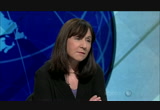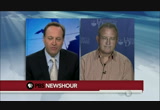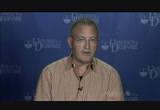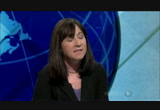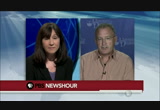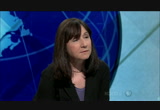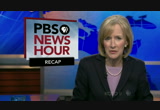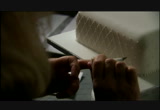tv PBS News Hour PBS January 10, 2013 3:00pm-4:00pm PST
3:00 pm
>> woodruff: and with five oscar nominations, we examine the controversy surrounding one of the most talked about new films yet to see a nationwide release; "zero dark thirty," about the hunt for osama bin laden. >> brown: that's all ahead on tonight's "newshour." >> major funding for the pbs newshour has been provided by: ♪ ♪ moving our economy for 160 years. bnsf, the engine that connects us. >> and by the alfred p. sloan foundation. supporting science, technology,
3:01 pm
and improved economic performance and financial literacy in the 21st century. >> and with the ongoing support of these institutions and foundations. and... >> this program was made possible by the corporation for public broadcasting. and by contributions to your pbs station from viewers like you. thank you. >> brown: as unemployment, growth and budget concerns continue, the man who will lead president obama's new economic team was formally nominated today. the announcement came this afternoon, the latest in a series of major cabinet changes. >> one reason jack has been so effective in this town is because he is a low-key guy who prefers to surround himself with policy experts rather than t.v. cameras. >> brown: with that, the president introduced his nominee to be the next secretary of the
3:02 pm
treasury, jack lew, the man he made his chief of staff, a year ago yesterday. lew would succeed tim geithner, who drew fulsome praise from the president. >> when the history books are written tim geithner's going to go down as one of our finest secretaries of the treasury. our economy is better positioned for tomorrow than most of those other countries hit by the financial crisis. the tough decisions tim made and carried out deserve a lot of credit for that. >> brown: at 57, lew is already a 30-year veteran of washington. he was a principal domestic policy advisor to house speaker tip o'neill in the 1980's, and negotiated with the reagan white house on social security and tax reform. later, he served two stints as the country's budget director, first under president clinton, then under president obama, before becoming white house chief of staff. today, in the east room of the white house, the nominee voiced his gratitude. >> thank you mr. president for
3:03 pm
your trust confidence and friendship. serving in your administration has allowed me to live out those values my parents ensiled in me and i look forward to continuing with the challenges ahead. >> brown: lew, and other top administration officials, face the immediate task of negotiating with republicans on raising the national debt ceiling, and agreeing on major spending cuts. some republicans have complained that lew has been unyielding in past negotiations. but the president said today: >> over the years he's built a reputation as a master of policy who can work with members of both parties and forge principled compromises. >> brown: the announcement came a day after labor secretary hilda solis announced she's stepping down after four years on the job. solis was the first hispanic woman to serve in a top cabinet position. and, she's the latest of several high-profile women to depart, including secretary of state hillary clinton and lisa jackson, administrator of the environmental protection agency. along with the president's
3:04 pm
earlier nominations-- for state, the pentagon and the c.i.a.-- that's raised questions about a loss of diversity in the cabinet. but yesterday, white house spokesman jay carney said the president's record on diversity should speak for itself. >> i mean, the increase in the representation of women in senior positions is dramatic-- it's consistent with or greater than president clinton's staff as well. >> brown: whatever the criticisms, the lew nomination is an early favorite to win senate confirmation. there's no word yet on when his confirmation hearings will begin. >> woodruff: for a closer look at jack lew and what his selection says about the president's economic agenda, we turn to two guests who have followed his career. jared bernstein worked with him in the white house as the economic adviser to vice president biden. and juliana goldman has long reported on his role as white house reporter for "bloomberg news."
3:05 pm
juliana, you describe jack lew as the president's consummate aide. what did you mean by that? >> he's one of the president's most trugsed advisors, he encapsulates the idea of no drama obama. he's a tough negotiator, he's pragmatic and he's been around washington, as we've just heard, for the last 40 some years. he's one of the preeminent budget experts in this town and has had a street at the table for some of the biggest budget fights over the last three decades. so the president wanted to have somebody at the treasury who he was very close to and who was going to be armed for the fiscal fights ahead. >> woodruff: you at one point in your profile today, you quote david plouffe, the senior advisor to the president saying lew has a quiet ferocity to him. and you cite an incident during the 2011 debt limit fight with the republicans.
3:06 pm
>> that's right. it was sort of the 11th hour of negotiations and lew came up with the idea of the sequester and at the last minute the republicans came back and said they wanted to attach medicaid cuts to the automatic spending cuts that would be in place if they weren't able to come up with a long term fiscal solution that we now know is the sequester and lew, he hadn't slept in days, he was on speakerphone and he sort of yelled "no! we're not doing that." and he hung up the phone on the republicans and ultimately those medicaid cuts weren't included but also telling about jack lew, he was pretty embarrassed by the incident because for him that kind of rare outburst was something you don't often see from him. other people in the room said that for jack lew that's angry but it's not necessarily how other people display their anger. >> woodruff: jared bernstein, what's he like to work with? >> very insightful, deep
3:07 pm
knowledge of fiscal matters. he's been working, as you heard, on budgetary issues for about three decades and these are issues that get more and more complicated. jack keeps that all in his head. extremely good listener, very reasonable person but one of the things you always hear that reminded me in listening to juliana, a constant in my work with jack and his career has been a recognition that one of the important roles of government is the to protect economically vulnerable people. you heard hit in the medicaid story but you can say the same thing about protecting the social safety net, about medicare. this isn't a guy who won't put spending cuts on the table or won't even entertain -- he's a guy who would entertain cutss to entitlements but they have to be structured in a way that protect economically vulnerable retirees people who have been hurt by recession, people have been hurt by income inequality. deep values held by jack lew. >> woodruff: juliana, if he's prepared to entertain cuts by
3:08 pm
entitlement programs, the social programs, social security and medicare, why are republicans already being critical? jeff sessions, ranking republican on the budget committee saying he doesn't want to see him confirmed. >> because their criticism is less about jack lew the individual and what jack lew has stood for historically in his career and more about this administration's fiscal policy you can expect to see these confirmation hearings will be a proxy for the looming debt ceiling debate and other debates going forward about the administration's fiscal plan. >> woodruff: jared, whator all does this choice say about what the president's priorities are when it comes to the economy? >> i think it says two things. one is that the president wants jack lew there for these upcoming fiscal deadlines. the sequestration, the debt ceiling, things like that. he knows that jack is not just a tough negotiator and i think this next point has gotten mixed
3:09 pm
he's a successful negotiator. i know republicans are complaining because he took a tough line back in 2011 with a lot of tea party folks but in fact he's been closing deals for 30 years the second thing is jack understands what it means, a very important part of the president's second term agenda. he understands what it means to get our debt on a sustainable trajectory. there's a lot that has to happen for that to occur. we've gotten a good chunk of the way there but in order to complete the deal so that our debt stabilizes over the budget window that's something jack lew knows how the do and i think the president wants the treasury secretary with that on his agenda. >> woodruff: juliana, it's been pointed out by republicans and others that his experience on wall street and the business community is minimal. he only spent a few years -- most of his adult life has been in washington. what does the white house think about that?
3:10 pm
do they view that as a strength? are they concerned? >> they've been hearing from top business executives that it's a concern that he doesn't have particularly the international financial experience that tim geithner has. some to deal with europe and to deal with china so that's something where you could look to see a deputy named who would have that kind of experience to fill that void but on the other hand it does send a signal to the europeans, to other countries around the globe that the president does want to see somebody who does have that sense of fiscal discipline and a budget expertise as the united states confronts the looming spending fight. >> i think all of that is very much a part of his job and important but one thing that needs to happen and soon that's right in the treasury secretary's bailiwick is to do the financial reform that is part of implementing the dodd-frank legislation. the next treasury secretary must
3:11 pm
implement those rules in such a way as to provide the overnight, the regulation that our financial markets have lacked for so many years and if we don't do that, we'll be right back in the soup sooner than later. >> woodruff: do you think jack lew is the person to do that? >> i think he'll be a very effective regulator. i think we have to see how tough he's going to be as a financial market regulator. that's a bit of an unknown at this point. >> that is a concern and the concern express one hears from the left that not enough focus on creating jobs, there's a lot of focus on cutting, on fiscal stringency. what about that angle of this appointment? >> one of the things you hear from administration officials and the president said it today is that for jack lew the numbers have people behind them and so of course you've got budget issues, the regulation
3:12 pm
implementing dodd-frank but confronting unemployment is going to be a top priority and jack lew as the president said he's a man of deep faith and that's somethat that will motivate him and he'll be able to apply to the unemployment crisis that this country is still facing. >> woodruff: do you expect he'll have a difficult time with confirmation, jared? >> it won't be a cakewalk but he'll be confirmed. he has people he's worked with over the years who recognize him as someone they can deal with this is a man who remembers the word compromise. we can't move forward without that and jack nose that. >> woodruff: juliana, what's the white house saying about that the? >> it won't be as smooth as they would have liked but jack lew, his issues with republicans are more on the house side and less on the senate side but the confirmation hearings won't be as smooth but they won't be as difficult as for defense secretary nominee chuck hagel.
3:13 pm
>> woodruff: juliana goldman with bloomberg news, jared bernstein, thank you. >> brown: still to come on the "newshour": bombings in pakistan claim more than 100 lives; the new ability to pay mortgage lending rules; political uncertainty in venezuela and hollywood's take on the hunt for osama bin laden. but first, the other news of the day. here's hari sreenivasan. >> sreenivasan: vice president biden will send his recommendations to curb gun violence to president obama by tuesday. the vice president held another round of meetings on the topic in washington today. this time, including sporting groups as well as the powerful national rifle association and others. mr. biden said a consensus is emerging for tightening background checks and banning high-capacity ammunition magazines. >> there's got to be some common ground here to not solve every problem but diminish the probability that what we've seen in these mass shootings will occur and diminish the probability that our children are at risk in their schools. >> sreenivasan: late today, the n.r.a. issued a statement saying
3:14 pm
it was disappointed that the discussions focused mainly on what it called an agenda to attack the second amendment. the group said it hopes to have an honest conversation with members of congress. there's been new border violence between india and pakistan in the disputed territory of kashmir. today, indian troops shot and killed a pakistani soldier in the mountainous region. kashmir is divided, but both countries claim it in its entirety. pakistan claimed the shooting was unprovoked, but the indian military said the pakistanis fired first. in all, two pakistani soldiers and two indian troops have been killed since sunday. in kenya, wildlife rangers in kenya kept searching for a gang of ivory poachers who killed a dozen elephants and hacked off their tusks. it was the worst single poaching incident the country has ever seen. we have a report from rohit kachroo of "independent television news." >> reporter: corpse after corpse scattered across a national park victims of a gang which struck over the weekend.
3:15 pm
but what future for the orphans that we saw today? they're the young of a generation hit hard by an explosion in demand for ivory. this elephant orphanage in nairobi has rarely been so busy. some are very young, others old enough to have the tiny tusks that may someday make them as valuable as their parents were. this is a terrible reflection on the state of elephant poaching right around east africa. whilst the populations in the wildlife sanctuaries and national parks are falling, here in the orphanages, they're rising and fast. the woman that rescued them is searching for solutions and wants governments to do much more. >> they better start thinking about elephants rather than trade. they've got to vote to ban the sale of all ivory, whether it's legal or illegal. forever. everybody can live without a
3:16 pm
trinket. >> reporter: governments will meet at the cites conference in march to discuss the ivory trade, but they know that somehow they need to cut consumer demand. >> in the 1980s, people in europe -- america didn't think twice about buying ivory, it was a normal thing for them to do and through a lot of campaigns, attitudes were changed. quite quickly. how quickly that can happen in other countries, i'm not sure. >> reporter: but it is a change that they desperately need. >> sreenivasan: word came later that kenyan police killed two suspected poachers in a gun battle today. it was unclear if they were part of the gang being sought in last weekend's attack. the debate over head injuries in pro football took a new turn today. a brain analysis found former n.f.l. great junior seau was suffering from c.t.e., a degenerative brain disease, when he committed suicide last may. the national institutes of health said there were abnormalities widely linked to repetitive blows to the head. seau had been a star linebacker for 20 years before retiring in 2009. in economic news, american
3:17 pm
express announced it's cutting about 5,400 jobs as it restructures. the reductions will come mainly in the company's travel business. and on wall street, stocks had a good day, after reports suggesting the economic outlooks in china and europe may be improving. the dow jones industrial average gained more than 80 points to close at 13,471. the nasdaq rose nearly 16 points to close above 3,121. the standard and poor's 500 hit another five-year high, topping 1,470. those are some of the day's major stories. now, back to judy. >> woodruff: a series of bombings across pakistan killed over 100 people today and injured scores more. a short while ago, ray suarez talked by phone to "new york times" reporter declan walsh in islamabad about the attacks. declan walsh, welcome to the program. let's begin with the second quetta attack because it was the most deadly of the three. what was the target and who's suspected to be behind it?
3:18 pm
>> earlier this eve new york stock exchange suicide bomber walked into a club in an ethnic part of quetta, that's the community which immigrated from afghanistan about a century ago and has suffer add series attacks at the hands of sunni death squads over the last couple of years. so the suicide bomber blew himself up inside the hall killing a number of people then five minutes later just after the police and media and rescuers arrived, a second bomber exploded his car just outside the club that was a much larger explosion. it collapsed the roof of the building and took the majority of the casualties. as things stand now the police are saying 81 people have been killed in the attack and at least 171 injured. >> suarez: pakistan has been such a tense place for so long. how much does the sectarian divide contribute to the overall violence and death? >> there's been a serious sectarian problem in pakistan for several decades now but it
3:19 pm
has -- there's been a marked increase in those attacks over the last couple years. the hazara community in quetta who are a minority that are distinguished by their physical features as well as everything else has suffered the brunt of attacks over the last year in that particular city but there also have been horrific attacks on shiite minority in karachi, in the mountains in the north, in several cities across the country and it's seen as a sign of the crumbling authority of the state and some of these places and also in the rise in the strength and the boldness of some of these extremist groups who feel that they can operate with immunity in these cities without any danger of being caught. notably in quetta even though there have been dozens of attacks on the same minority over the last year, there have been few to none arrests by the police and no convictions in the court to take any of those responsible for the attacks to task. >> suarez: today there was an
3:20 pm
attack on a sunni mosque. tell us about that >> there was an attack in the northwest of the country in the swat valley, that's an area which had been controlled by the taliban just three years ago in the pakistani army came in, launched a sweeping operation to push them out but in recent months we've seen the taliban creeping back in a couple of weeks ago, a couple of months ago, rather we had an attack on the pakistani school girl malala yousafzai who was shot by the taliban and today we had this attack on a religious congregation hundreds had gathered to hear a leader speak in the main town and the death toll in that attack was 22 and was seen as another sign the taliban was not back in swat, certainly starting to reassert their authority there. >> pelley: there was a third attack in pakistan today, this one also in quetta. who was the target?
3:21 pm
>> earlier today there was a bomb attack on a pakistani paramilitary patrol in the center of quetta. that attack was carried out by a nationalist group that later claimed control -- rather that later claimed responsibility for attack. the ethnic nationalists have been fighting against the pakistani army, against the state for about seven or eight years now as part of a long-running conflict that province and they want those nation -- those nationalist fighters want independence with pakistan. they say they have little in common with the central state and they would like their own country and the pakistan army has responded with alacrity and sometimes human rights groups say with brutality against those nationalist groups but sometimes they strike back, as they did today, in the center of quetta. >> suarez: quetta is the capital of baluchistan. might this attack be totally separate, totally apart from the one that happened elsewhere in town? >> those two attacks appear to
3:22 pm
have very little in common. it underscores what a troubled city that the. this is a city where you have brutal sectarian attacks against the hazara minority, you have ethnic beluch attacks against the pakistani army and it's a city where there have been persistent allegations that the afghan taliban leadership, often known as the quetta shura, has been based over the last decade using that city to direct attacks on nato and american soldiers inside afghanistan. >> suarez: what kind of ripple effect could this violence have more broadly for pakistan? >> this is a worrying sign for the stability of pakistan as it enters a very sensitive period. elections are due to take place within the next three or four months and there are many pakistanis who worry that if the security situation continues to spiral out of control such as it appeared to be doing today that this could create the circumstances where the political process could be in danger even of being derailed.
3:23 pm
>> suarez: declan walsh reporting from islamabad, thanks for joining us. >> my pleasure. >> brown: next, new mortgage rules from the government, designed to clamp down on risky lending practices. margaret warner has the story. >> warner: at the root of the 2008 credit and housing bust were risky, even reckless mortgages made to customers who couldn't afford them. today the new consumer financial protection bureau issued regulations spelling out how lenders must ensure borrowers can repay their loans. banks that follow the criteria would be protected from most lawsuits. to meet the standard of a qualified mortgage, a bank would have to verify the borrower's income, employment and total debt, which could not be more than 43% of his or her income. those criteria prohibit subprime loans, teaser low-rate mortgages with balloon payments later,
3:24 pm
interest-only mortgages and fees of more than 3% richard cordray is the director of the agency and he joins me now. mr. cordray, welcome. thank you for joining us. >> my pleasure. >> now banks and mortgage lenders have already very much tightened their lending standards. why are such specific regulations needed now? >> if you go back and remember how we came upon the financial crisis, it happened because of tremendous amounts of reckless lending in the mortgage market. you had many loans where are consumers were set up to fail. there was not careful attention to whether a borrower could repay a loan. that got us into trouble, it sank the economy and we want to make sure that does not happen again. >> warner: to what degree do you think these specific criteria you all have set up will get up to the heart of what led to the
3:25 pm
bubble and the bust? in other words how many of the sort of abuses do you think you're covering here? >> so we're taking on some of the very specific problems we know helped create the financial crisis. first of all no dock loans, where the lender didn't even pay attention or ask for didn't station there the borrower. we had what were called ninja loans. no income, no job, no assets yet borrowers could manage to get loans approved. we had loans were introductory teaser rates were treated as the rate that would last through the entirety of the loan so they were underwritten not against the real price of the loan but against artificial introductory rate. those were loans that ended up setting up many consumers to fail and they were the heart of the reckless lending that helped precipitate the crash and the housing market. >> let me ask you about the 43% debt-to-income ratio. that debt includes, say, student loans, credit card loans. how many borrowers will be shut
3:26 pm
out of being able to afford a mortgage, for a house they'd want. because of that total debt limit. >> so there's a couple things we've done here. we've set a debt-to-income ratio for a qualified mortgage, which is a subset of mortgages within the ability to payrolls that get the maximum protections for consumers. that's a more generous level than typical underwriting had been. used to be around 33% of income. we've also included a temporary provision that takes account of the fact that we have fannie mae and freddie mac undergirding most of the market now and we'll allow for a transition as congress and others consider how to reform those entities. >> warner: have you been able to quantify how many people today are getting mortgages though their total debt-- i'm thinking particularly student debt which didn't used to be a huge factor but is for a lot of young people
3:27 pm
now-- how many people are getting mortgages for that, say 50% total debt that just will be shut out now. >> so giving the criteria i've dried, not only the 43 debt ratio but the other provision we have crunched the numbers and it appears all of the existing mortgage market would be covered by this rule. so we don't think that we're going to be crimping lending and we don't mean to be and don't want to be crimping lending. we've drawn them real carefully to avoid that. with stronger consumer protections and clearer rules of the road that's good for lenders because they have more certainty they should be able to get more secondary market financing to support their lending. secondly, they don't have to compete against the reckless lending that undercut them the market. often misled consumers into taking out bad loans when they could have gotten responsible loans, that's not longer going to be the case in this market
3:28 pm
and that's good for everybody. >> warner: so do you think on balance in the short to medium term this will further restrict lending? a lot of people are complaining now it's very hard to get a mortgage. or do you think it will actually boost it? >> i actually think this is going to boost lbding because as i said it will provide more certainty for the market. many people were watching to see what this rule would provide. we are providing a potential exemption and it's a proposal to take account of community banks and credit unions and give them more leeway to make the kind of loans they make in small communities across this country. we're looking at an exemption for nonprofits such as habitat for humanity and others and i think in the end we'll have a robust portfolio of mortgage financing and we want to see this housing market recover and this rule is a step in the right direction. >> warner: how tight or complete is this safe harbor you're offering to banks, that is protection for from lawsuits, if they issue a qualified loan
3:29 pm
versus one -- i guess they're still going to be able to issue loans that don't meet this criteria. >> that's correct. this safe harbor, this has to do with the extent of liability a lender can incur. the bottom line is consumers can still have their day in court. they can ebb force all the other consumer protection laws that aren't affected by today's rule and if it's a qualified mortgage they can still go to court and challenge whether those criteria were met. they're fairly bright line criteria so i wouldn't expect a lot of challenges but consumers have that available to them in the more risky subprime space that was the cause of the crisis consumers can go to court and challenge whether they had the ability to pay and the lender paid appropriate attention to them. >> but the lending, the mortgage industry generally was supportive today after you issued these rules. there must be something they like about it. >> i think they like certainty here. we've tried to draw bright lines
3:30 pm
and not leave things fuzzy that will have to go into the courts and be resolved over many years. people were waiting for this rule and we've drawn the circle of qualified mortgages quite broughtly so as not to cramp lending in the mortgage market. so i think on balance this is a good direction for lenders, good for consumers, they can have confidence that the lender has to check on the numbers and make sure they check out. that's fairly common sense but it wasn't something that was present in the mortgage market the go-go years and consumeers can have confidence they go to the closing table, they're not being set up to fail. >> warner: richard cordray, head of the consumer financial protection bureau, thank you. >> my pleasure. >> woodruff: we turn now to venezuela, where president hugo chavez was supposed to be inaugurated for a new term today but was instead out of the country. ray suarez has more on the reason for and controversy
3:31 pm
surrounding his absence and the future of his political movement. >> reporter: thousands of supporters descended on the presidential palace in the venezuelan capital, caracas, today, chanting and waving flags in a show of support for their ailing, absent president. venezuela is a country of 29 million people, an oil exporter subsidizing energy-hungry poor countries, like cuba and haiti. and it sends 800,000 barrels of oil a day to the u.s.-- its number one customer. president hugo chavez has led the nation for 14 years. his third term expires today. he won re-election in october and was supposed to be sworn in again today for another six years, as the constitution requires. but chavez suffers from aggressive, reoccurring cancer, hasn't been seen in public in a month and was too sick to return to venezuela from medical treatment in cuba.
3:32 pm
>> the illness of the president has been treated like a state secret from the beginning. he has been treated in cuba under a veil of secrecy. >> reporter: moises naim is a former venezuelan cabinet minister, now a columnist and a visiting scholar at the carnegie endowment for international peace in washington. he says keeping chavez alive in havana strengthens the president's number two, nicolas maduro. >> and this is essentially a power play. behind that secrecy there is nothing but an attempt to ensure the continuity of the regime regardless of president chavez's presence. >> reporter: the u.s. state department, after sparring with chavez' venezuela for more than a decade, was restrained in its response today to the government and court's decision to extend the inaugural deadline. >> obviously the inauguration did not go forward today as planned. we've been saying all the way through, that it's up to venezuelans to decide on the next steps. >> reporter: and nuland
3:33 pm
expressed a desire to re-set the relationship, saying the u.s. is open, but it's up to venezuelans. >> our sense is that at the moment, they're very much preoccupied with internal affairs. so we're standing by. >> reporter: the former soldier and coup leader turned elected president antagonized washington, it seemed, whenever he could, forging friendships with iran's mahmoud ahmedinejad, syria's embattled bashar al- assad and he formed an especially close bond with cuban presidents fidel, and raul castro. while relishing his role rallying the latin american left against u.s. led free trade and anti-terrorism efforts, chavez had an opponent he couldn't beat in cancer. he bore his sufferings in public, talking about his treatment, showing the effects of radiation and chemotherapy. then after treatments in cuba, he would pronounce himself cleared of cancer, and ready to return to the country's business.
3:34 pm
>> free, i am totally free. >> reporter: during last year's campaign, he didn't disclose specifics about the nature, location, or severity of the cancers. >> ( translated ): i'm leaving, but the high political authority, although i will not hand it over, i will delegate it and it is in good hands. here is nicolas maduro and all of the political cabinet of the republic. >> reporter: after he left the government in the hands of his hand-picked number two, chavez' treatment and condition remained shrouded in secrecy. >> ( translated ): the president is carrying out his medical treatment. it is a very strict treatment. >> reporter: that lack of information has led to confusion and anger. >> ( translated ): in the morning they tell us the president is in a serious condition, but then in the afternoon they say he is exercising. that has created a wave of rumors, a wave of uncertainty and economic and political instability across the nation.
3:35 pm
>> ( translated ): the population is confused and a big part of it is also annoyed, because, despite more than 25 announcements about the health of the president, until now we have not had one single venezuelan medical report. >> reporter: the man who tried to unseat chavez in the last election, opposition leader henrique capriles, says a high court decision to postpone the inauguration solves nothing. >> ( translated ): make no mistake, none of these directors of the government received a presidential mandate on october 7. there is only one leader of the party that is in front of us, who is the president of the republic who was elected on the 7th of october. don't confuse one thing with the other, not the vice president of the republic nor any of these directors received a mandate nor fit into the shoes of the leader they say they are defending. >> reporter: cynthia arnson, director of the latin america program at the woodrow wilson center for international scholars, says capriles, who came closer than anyone to unseating the president will likely lead those who want to end the chavez era.
3:36 pm
>> he will remain, i think, the person that the opposition will put up to run against maduro but i think he's coming from behind and it's also going to be a very difficult, a very short period of time in which to organize another national election. >> reporter: but chavez remains popular, and loved, by half the population. >> ( translated ): i love you, i love you, we need you. >> reporter: one supporter says, "i love you. we need you." a priest adds this prayer. "the cancerous cells be defeated, maduro's been running the country and giving detail-free updates on chavez' health. >> ( translated ): president chavez is conscious of all the circumstances he's living through, which are complex circumstances. he's conscious of the battle he is fighting and he has a spirit of battle as always. >> reporter: here's where the power struggle gets interesting. now that the supreme court has extended the chavez term
3:37 pm
indefinitely, vice president maduro's position is secure. but the vice president is appointed, not elected. he has a rival in the head of the national assembly, who would become venezuela's interim leader for 30 days if chavez dies. the national assembly president, diosdado cabello, has strong ties with the army, an important power base in venezuela. we asked arnson whether you can have the president's movement, chavismo without chavez? >> the movement will definitely survive but it will be very different. there will be different factional conflicts, there's really no one who claims the heart and soul of the ardent chavez following in the same way that hugo chavez has been able to do over these years. >> reporter: naim says in one way, it doesn't matter who's in power-- maduro, cabello, even chavez himself. whoever is president this year will face the severe economic consequences of the last decade of mismanagement.
3:38 pm
>> even if president chavez comes back, for some reason, he will have to make decisions that he has avoided for 14 years. a devaluation of the currency will be necessary. cutting of the spending of the public sector will be also necessary. and cutting imports is going to be very important. and dealing with inflation, dealing with all sorts of distortions that have accumulated in the economy and that are going to be very hard to sustain in the near future. >> reporter: even with high oil prices, running a society on imported goods, generous price subsidies, and cronyism is more expensive than hugo chavez could afford. >> woodruff: online, we have a profile of chavez's number two-- vice president nicolas maduro, a former bus driver and union leader who is a loyal supporter of the ailing president.
3:39 pm
>> brown: finally tonight, this was oscar nomination day. the civil war-era drama, "lincoln", led the pack with 12 nominations, followed by the fantasy, "life of pi", with 11 and "les miserables", with eight. another new film, "zero dark thirty", looking at contemporary history, received five nominations, including for best picture, best screenplay and best actress. but even before it's been released nationally, the film is generating a great deal of debate. the movie-- starring jessica chastain as a tireless cia operative-- sweeps from the haunting first moments of the 9/11 attack to the successful raid on osama bin laden's compound in pakistan in may of 2011. director kathryn bigelow and writer mark boal previously collaborated on the oscar winning 2009 film, "the hurt locker." the new film tells viewers at
3:40 pm
the beginning that it is based on accounts from those involved in the manhunt. >> it puts the audience in the shoes of those individuals at the heart of the hunt so it's very, experiential. >> a movie that's riveting, exciting and takes you behind the scenes of a world that quite frankly is usually closed from public view. >> brown: indeed, the film captures the sometimes dreary, sometimes dramatic ways of so- called "tradecraft": the dogged pursuit of sources, clues, patterns, anything that might lead to the capture or killing of terrorists. the controversy has come over its at times graphic depiction of so-called "enhanced interrogation" and torture including waterboarding. several prominent lawmakers, including republican senator john mccain-- himself a victim of torture in the vietnam war-- criticized the film for suggesting that such methods were helpful in finding bin laden. mccain spoke on cnn.
3:41 pm
>> first of all, the brutality depicted there is very disturbing. the moral of the story is that torture does not work. it is hateful, it is harmful, incredibly harmful to the united states of america. and to somehow make people believe that it was responsible for the elimination of osama bin laden is in my view unacceptable. >> reporter: mccain and democratic senator dianne feinstein, who heads the senate intelligence committee, sent two letters to the acting c.i.a. director, demanding to know what information the agency had provided the filmmakers. at a washington, d.c. screening tuesday night, protestors dressed as detainees outside the newseum showed their objections, while inside, the filmmakers, who have said they deplore torture, told the "newshour" the dramatized account was intended to highlight an extraordinary intelligence effort. >> everybody's entitled to their opinion and there's certainly a moral complexity to that ten- year hunt but what i'm most
3:42 pm
proud of is that the film sheds light on the professionals in the intelligence community who in ten years dedicated their lives, in some cases sacrificed their lives, to this very successful operation. >> one thing, we look for in a movie in my business or talk about when we talk about a work of art is complexity. and the ability of something to mean different things to different people. >> brown: "zero dark thirty" opens nationwide tomorrow. i'm joined now by two journalists who've written widely on the ten year hunt for osama bin laden and, in recent weeks, on the new film. jane mayer, of "the new yorker", is author of "the dark side; the inside story of how the war on terror turned into a war on american ideals." mark bowden is author of "black hawk down". his latest book is "the finish: the killing of osama bin laden." he writes for "the atlantic" and teaches journalism at the university of delaware. jane mayer, you've written that "zero dark thirty" "distorts a
3:43 pm
difficult history, seems to turn torture into morally neutral entertainment." give me the essence of the problem you see. >> well, the filmmakers say in the beginning it's based on real accounts. so it sets up an expectation that it will be accurate history of what happened during those years in the war on terror and instead what it does is distorts the history, i felt, by leaving out the complete moral and ethical and political context in which this torture program took place. there were fights from start to finish about whether torture was something appropriate for the united states to get involved in. it's not just whether it worked but it was whether we could do better and whether it was illegal and wrong. and not a whiff of that is in this movie. so i felt by missing it, it missed the real drama of that period. >> brown: you wrote "the criticism is unfair, torture may be morally wrong and not the best try obtain information but detainees but it played a role in america's messy decade-long
3:44 pm
pursuit of osama bin laden and zero dark thirty is right to portray that." explain. >> well, i think it is a feature film that tries to present the story in broad strokes and it shows-- i think appropriately-- that our early efforts to find bin laden and the other al qaeda leaders involved in the use of these interrogation methods. however the film itself, i don't think, is either pro-torture nor anti-torture. i think it just presents the story as it happened and in fact the early more graphic scene shows torture to be both repellant and futile. >> well, jane, this gets to part of one of the questions when we saw filmmakers talk about complexity of all this. how much do we even now today today know about the early break throughs in the hunt for bin laden?
3:45 pm
>> it depends which "we" we're talking about. there is a huge record of this that's been compiled by the senate intelligence committee 6,000 pages long which has not yet been released to the public. so reporters like myself, even though i've spent years covering this, have many gaps. i've spent a couple hours today trying to compile what's known about how we found bin laden and basically there are five detainees that gave shreds of information that got us to the currier that got us to bin laden as far as i can tell. there's a lot missing which allows people with different points of view to manipulate the facts. so you have people in the c.i.a. trying to make it look like what they did was great and had to be done. >> brown: so are you saying -- is it a question of torture not having worked or that in this movie they don't show that there was a great debate about whether it worked or whether it was moral? >> well, it's a combination. i should say i think the movie -- filmmakers have a right to make any movie they want. i'm all for artistic freedom.
3:46 pm
but in the same vein, as someone who really followed this history i feel like i have the right to comment on what they've done and what they've done they have compressed a lot of very complicated facts into what's basically a slick kind of t.v. show, sort of police procedural where it's very gripping and it's fun to watch but there's no moral context and basically the question of whether torture works, that's complicated. sometimes it did; sometimes it didn't. frequently what happened was people lied and what the c.i.a. said in two very important cases is that they found bin laden's currier because the lies tipped them off that there was something more going on. that's a very shaky kind of basis chon they say torture worked. to say because they lied torture works. >> brown: mark bowden, what do you think. >> i've written a book on this subject so i can say with as
3:47 pm
much certainty as almost anyone that the point that torture did not present the key information that led to bin laden. there was never a moment where someone coughed up a critical piece of information. the true story is a lot more complicated than that and i think it's reflected fairly well in the presentation in the film in that the early very repulsive and ultimately futile torture sequences are followed by one where they try different tactics with the detainee and he tells them a piece of information that is not directly relevant to what they're looking for and that i don't think they-- and it showed that this way in the film-- either they or the detainee recognized -- will become tremendously significant down the road. but that, nevertheless, is how that name of the courier first surfaces. so in my way of looking at it that's -- it's not exactly what happened, clearly. the detainee portrayed is an
3:48 pm
amalgam. the dialogue is made up. but it reflects what i think fairly accurately what those early stages of the hunt -- >> i would disagree in that -- in one ways which this movie opens with someone being waterboarded. nobody who was waterboarded ever gave information that led to finding bin laden. and this detainee is held by the c.i.a. in the beginning of the movie. the first sleds of information that came out about the courier came from people in guantanamo, which were held by the military, not c.i.a.. so this glorify it is c.i.a.'s worst torture methods, turns it into kind of a straight line that's like a necessary evil that gets you from waterboarding to finding bin laden. i'd be surprised if many people in the country don't conclude torture is a necessary evil and that tends justify the means. >> brown: that's where i wanted to go because i you raised the it's a movie factor. it's a dramatization. and i'm thinking in my head
3:49 pm
today we saw the nominations for another historical drama "lincoln." i like many people saw it and liked it then we might realize not everything is factual there. you're suggesting that that's okay in a sense even though this is about more recent history? that we should see it as a kind of drama? >> yes, and i think that's how you should see it. i think that -- i've been critical somewhat of the hype around the film, that it's journalistic, it isn't. it's -- you know as truthful as any hollywood movie-- more than most-- that purports to be based on a true story. i do think when when we get into the particulars of who first mentioned the name of ahmed the kuwaiti and under what circumstances i don't think any of us knows precisely what happened but i do think it's fair for the filmmakers to show that in those early years the mistreatment of detainees during interrogation was commonplace and i think it's portrayed as
3:50 pm
very ugly and in a very i think compromising way. >> can i say one thing more? i'm a big fan of mark's but i just think that one what it doesn't show is even in those earliest scenes when the first detainee was waterboarded there was -- some of the people in that room threw a fit. you do not see that in many this movie. there was an f.b.i. agent who walked out and said "i won't have anything to do with this, it's illegal, it's wrong, it's what our enemies do." there's not a character in this movie who raises the question about whether torture is right or wrong let alone whether it works. >> brown: let me ask you very briefly in our last 30 seconds. your fear here is that this portrayal will impact public understanding and possibly policy? >> i think pop culture is incredibly powerful. i think the t.v. show "24" if you look at the numbers changed
3:51 pm
public opinion and made people much more comfortable with torture. >> brown: mark, do you think this will affect public policy and perception? >> i think it will affect the way people remember this story. i personally didn't take away, as jane has, a strong mess on the subject of torture one way or the other. i did, for instance, from the show "24" which is clearly pro-torture, not from this, though. >> brown: mark bowden and jane mayer, thank you very much. >> thank you. >> brown: we have an extended interview with director catherine bigelow and the writer on our web site. >> woodruff: again, the major developments of the day: president obama nominated white house chief of staff jack lew to be his next secretary of the treasury, subject to senate confirmation. pakistan suffered one of its deadliest days in recent years, as a series of bombings killed at least 115 people and wounded hundreds more.
3:52 pm
and vice president biden said he will send recommendations on curbing gun violence to president obama by tuesday. but the national rifle association charged the discussions it attended today were mostly an attack on gun owners' rights. how many skiers does it take to move a mogul? we have the answer in today's science thursday report. hari sreenivasan has more. >> sreenivasan: those tricky mounds of snow on well-traveled ski slopes? they actually move uphill over time as skiers move downhill, a study finds. watch a time-lapse video of the phenomenon our science page. the oil boom that has driven hordes of newcomers to western north dakota has been dubbed "the modern gold rush." independent producer todd melby -- with the support of public media partners-- tells the stories of those looking for opportunity there in the interactive documentary, "black gold boom." but, as we see in one story, opportunity is not all they find.
3:53 pm
>> you know, i would love to make, you know, a home here and put down roots but not with the boom going on. there is life out here for women and when girls come out here now they think it's flattering, like i did when i first got out here. and i very quickly reassure them that it's not and they need to be very careful because these guys will -- they'll take advantage of you. they will. they have families back where they're from and then they come here and they think "out of sight out of mind." but it's not like that. not for us it's not. i don't go running without abbey or somebody. and when we have guys who rev their engine, you know, peel out in front of us, it's not flattering, it's not an attractive thing for us. i have more weapons in my vehicle than the gun shop down the road here. i carry a .22 pistol, i have an eight-inch blade and a taser and
3:54 pm
pepper spray. basically when it comes in and comes out it takes more what it came with. i have a concealed weapons permit. i just load it. at that point full the safety off and then i cock it back. >> boxers are known as aggressive animals. >> you flip the switch and spray. it's not fair. we shouldn't have to worry. at 21 i shouldn't have a smallor mortared vehicle. >> sreenivasan: all that and more is on our website newshour.pbs.org. jeff? >> brown: and that's the "newshour" for tonight. i'm jeffrey brown. >> woodruff: and i'm judy woodruff. we'll see you online and again here tomorrow evening with mark shields and david brooks among others. thank you and good night. >> major funding for the pbs newshour has been provided by: >> and with the ongoing support of these institutions and foundations.
3:55 pm
3:58 pm
>> this is "bbc world news." funding for this presentation is made possible by the freeman foundation of new york, stowe, vermont, and honolulu. newman's own foundation. zte. and union bank. >> at union bank, our relationship managers work hard to know your business, offering specialized solutions and capital to help you meet your growth objectives. we offer expertise and tailored solutions for small businesses and major corporations. what can we do for you? >> and now, bbc world news america. >> this is bbc world news
3:59 pm
america. a triple murder in the heart of paris, three female rebels shot to death. the french government calls it an execution. a series of bomb blasts in pakistan claimed the lives of more than 100 people, many more injured. the nominations are out with lincoln leading the oscar pack. silver lining playbook has racked up an accomplishment not seen in 30 years. welcome to our viewers on public television in america and also around the globe. three kurdish women have been shot dead in paris in what police described as execution- style killings. one is being identified as the co-founder of the kurdish independent group that has been in an armed struggle with the in an armed struggle with the
171 Views
IN COLLECTIONS
KQED (PBS) Television Archive
Television Archive  Television Archive News Search Service
Television Archive News Search Service 
Uploaded by TV Archive on

 Live Music Archive
Live Music Archive Librivox Free Audio
Librivox Free Audio Metropolitan Museum
Metropolitan Museum Cleveland Museum of Art
Cleveland Museum of Art Internet Arcade
Internet Arcade Console Living Room
Console Living Room Books to Borrow
Books to Borrow Open Library
Open Library TV News
TV News Understanding 9/11
Understanding 9/11
